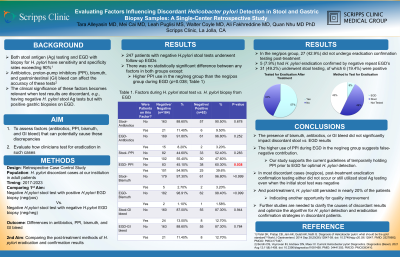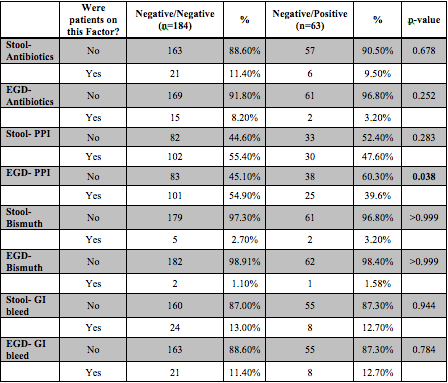Monday Poster Session
Category: Infections and Microbiome
P3420 - Evaluating Factors Influencing Discordant Helicobacter pylori Detection in Stool and Gastric Biopsy Samples: A Single Center Retrospective Study
Monday, October 27, 2025
10:30 AM - 4:00 PM PDT
Location: Exhibit Hall

Has Audio
- TA
Tara Alleyasin, MD
Scripps Green Hospital
San Diego, California
Presenting Author(s)
Tara Alleyasin, MD1, Mei Cai, MD1, Leah Puglisi, MS2, Walter Coyle, MD, FACG3, Ali Fakhreddine, MD1, Quan Nhu, MD, PhD4
1Scripps Green Hospital, San Diego, CA; 2Scripps Clinic, San Diego, CA; 3Scripps Green Hospital, La Jolla, CA; 4Scripps Clinic & Scripps Research Institute, La Jolla, CA
Introduction: Both stool antigen (Ag) testing and EGD with biopsy for H. pylori have sensitivity and specificity rates exceeding 90%. Antibiotics, proton-pump inhibitors (PPI), bismuth, and gastrointestinal (GI) bleed can affect the accuracy of these tests. The clinical significance of these factors becomes relevant when test results are discordant, e.g., having negative H. pylori stool Ag tests but with positive gastric biopsies on EGD. The study aims to assess factors that can potentially cause these discrepancies and evaluate how clinicians test for eradication in such cases
Methods: We retrospectively evaluated H. pylori discordant cases at our institution (2017-2023). Key factors- antibiotics, PPI, bismuth, and GI bleed- were compared in patients with negative stool Ag tests but had positive gastric biopsies (neg/pos) vs. patients with both negative stool and biopsy results (neg/neg). Lastly, the post-treatment methods of H. pylori eradication and confirmation results were analyzed.
Results: Among 247 adult patients with negative H. pylori stool tests who underwent follow-up EGD’s, 184 (74.5%) were in the neg/neg group and 63 (25.5%) were in the neg/pos group. There was no statistically significant difference between any factors in both groups except higher PPI use in the neg/neg group than the neg/pos group during EGD (p=0.038; Table 1). In the neg/pos group, 27 (42.9%) did not undergo eradication confirmation post-treatment; 5 (7.9%) had H. pylori eradication confirmed by negative repeat EGD’s; 31 (49.2%) underwent stool testing, of which 6 (19.4%) were positive.
Discussion: In our stool Ag-negative H. pylori patients, the presence of bismuth, antibiotics, or GI bleed did not significantly impact discordant stool vs. EGD results. The higher use of PPI during EGD in the neg/neg group suggests false-negative contribution. Our study supports the current guidelines of temporarily holding PPI prior to EGD for optimal H. pylori detection. In most discordant cases (neg/pos), post-treatment eradication confirmation testing either did not occur or still utilized stool Ag testing even when the initial stool test was negative, indicating an opportunity for quality improvement. Furthermore, post-treatment, H. pylori persisted in nearly 20% of the patients, indicating another opportunity for quality improvement. Further studies are needed to clarify the causes of discordant results and optimize the algorithm for H. pylori detection and eradication confirmation strategies in discordant patients.

Disclosures:
Tara Alleyasin, MD1, Mei Cai, MD1, Leah Puglisi, MS2, Walter Coyle, MD, FACG3, Ali Fakhreddine, MD1, Quan Nhu, MD, PhD4. P3420 - Evaluating Factors Influencing Discordant <i>Helicobacter pylori</i> Detection in Stool and Gastric Biopsy Samples: A Single Center Retrospective Study, ACG 2025 Annual Scientific Meeting Abstracts. Phoenix, AZ: American College of Gastroenterology.
1Scripps Green Hospital, San Diego, CA; 2Scripps Clinic, San Diego, CA; 3Scripps Green Hospital, La Jolla, CA; 4Scripps Clinic & Scripps Research Institute, La Jolla, CA
Introduction: Both stool antigen (Ag) testing and EGD with biopsy for H. pylori have sensitivity and specificity rates exceeding 90%. Antibiotics, proton-pump inhibitors (PPI), bismuth, and gastrointestinal (GI) bleed can affect the accuracy of these tests. The clinical significance of these factors becomes relevant when test results are discordant, e.g., having negative H. pylori stool Ag tests but with positive gastric biopsies on EGD. The study aims to assess factors that can potentially cause these discrepancies and evaluate how clinicians test for eradication in such cases
Methods: We retrospectively evaluated H. pylori discordant cases at our institution (2017-2023). Key factors- antibiotics, PPI, bismuth, and GI bleed- were compared in patients with negative stool Ag tests but had positive gastric biopsies (neg/pos) vs. patients with both negative stool and biopsy results (neg/neg). Lastly, the post-treatment methods of H. pylori eradication and confirmation results were analyzed.
Results: Among 247 adult patients with negative H. pylori stool tests who underwent follow-up EGD’s, 184 (74.5%) were in the neg/neg group and 63 (25.5%) were in the neg/pos group. There was no statistically significant difference between any factors in both groups except higher PPI use in the neg/neg group than the neg/pos group during EGD (p=0.038; Table 1). In the neg/pos group, 27 (42.9%) did not undergo eradication confirmation post-treatment; 5 (7.9%) had H. pylori eradication confirmed by negative repeat EGD’s; 31 (49.2%) underwent stool testing, of which 6 (19.4%) were positive.
Discussion: In our stool Ag-negative H. pylori patients, the presence of bismuth, antibiotics, or GI bleed did not significantly impact discordant stool vs. EGD results. The higher use of PPI during EGD in the neg/neg group suggests false-negative contribution. Our study supports the current guidelines of temporarily holding PPI prior to EGD for optimal H. pylori detection. In most discordant cases (neg/pos), post-treatment eradication confirmation testing either did not occur or still utilized stool Ag testing even when the initial stool test was negative, indicating an opportunity for quality improvement. Furthermore, post-treatment, H. pylori persisted in nearly 20% of the patients, indicating another opportunity for quality improvement. Further studies are needed to clarify the causes of discordant results and optimize the algorithm for H. pylori detection and eradication confirmation strategies in discordant patients.

Figure: Table 1. Factors during H. pylori stool test vs. H. pylori biopsy from EGD
Disclosures:
Tara Alleyasin indicated no relevant financial relationships.
Mei Cai indicated no relevant financial relationships.
Leah Puglisi indicated no relevant financial relationships.
Walter Coyle indicated no relevant financial relationships.
Ali Fakhreddine indicated no relevant financial relationships.
Quan Nhu: Regeneron – Advisory Committee/Board Member, Consultant, Speakers Bureau. Sanofi – Advisory Committee/Board Member, Speakers Bureau. Takeda – Advisory Committee/Board Member, Speakers Bureau.
Tara Alleyasin, MD1, Mei Cai, MD1, Leah Puglisi, MS2, Walter Coyle, MD, FACG3, Ali Fakhreddine, MD1, Quan Nhu, MD, PhD4. P3420 - Evaluating Factors Influencing Discordant <i>Helicobacter pylori</i> Detection in Stool and Gastric Biopsy Samples: A Single Center Retrospective Study, ACG 2025 Annual Scientific Meeting Abstracts. Phoenix, AZ: American College of Gastroenterology.
